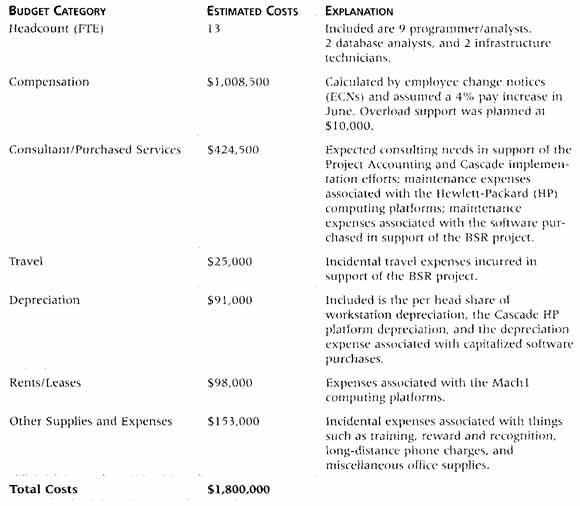Project cost budgeting involves allocating the project cost estimate to individual work items. These work items are based on the work breakdown structure for the project. The WBS, therefore, is a required input to the cost budgeting process. Likewise, the project schedule is required to allocate costs over time. The main goal of the cost budgeting process is to prepare budgetary estimates and to produce a cost baseline for measuring project performance.
Most organizations have a well-established process for preparing budgets. Continuing with the Business Systems Replacement example, the company involved required budget estimates to include the number of full-time equivalent (FTE) staff, often referred to as headcount, for each year of the project. This number provided the basis for estimating total compensation costs each year, as shown in the Table below. The budget also required inputs in the categories of consultant/purchased services, travel, depreciation, rents/leases, and other supplies and expenses. Notice that the total cost for the IS&T budget for FY97, $1,800,000, is based on the costs highlighted in the cash flow analysis in Table above ($600,000 for total purchased costs plus $1,200,000 for IS&T effort in FY97).
Table below: Business Systems Replacement Project Budget Estimates for FY97 and Explanations
Table above also includes explanations to support the budget estimates. Staff from the IS&T department included nine programmer/analysts, two database analysts, and two infrastructure technicians. Their compensation is based on employee change notices (ECNs), which provide actual salary and benefit information for employees when they are hired or transferred within the com pany. Notice that the compensation costs are the main part of the budget estimate. Having the largest part of cost estimates come from compensation costs is typical of estimates on many information technology projects. Also notice that the budget amount br compensation includes an allowance for raises and overload support or overtime pay. Other explanations include brief descriptions of the travel, depreciation, rents/leases, and other supplies and expenses for the project. It is very important to document assumptions and explanations when preparing cost estimates and cost budgets.
In addition to providing input for budgetary estimates, cost budgeting pro vides a cost baseline. A cost baseline is a time-phased budget that project managers use to measure and monitor cost performance. Estimating costs for each major project activity over time provides project managers and senior management with a foundation for project cost control.


